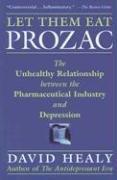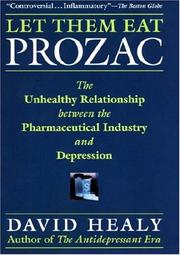| Listing 1 - 10 of 21 | << page >> |
Sort by
|
Book
Year: 1996 Publisher: Caddo: Professional commnications,
Abstract | Keywords | Export | Availability | Bookmark
 Loading...
Loading...Choose an application
- Reference Manager
- EndNote
- RefWorks (Direct export to RefWorks)
Book
Year: 2017 Publisher: Bruxelles: UCL. Faculté de pharmacie et des sciences biomédicales,
Abstract | Keywords | Export | Availability | Bookmark
 Loading...
Loading...Choose an application
- Reference Manager
- EndNote
- RefWorks (Direct export to RefWorks)
Antidepressants are not east to use in clinical practice, the delay for the appearance of the effects is long, remission is only observed with 30% of the patients and many of them need to change treatment several times, which can sometimes contribute to the severity of the depression of the patient. Some researchers turn to pharmacogenetics to try to explain this phenomenon. Genes can influence the plasmatic and cerebral concentrations of the drug and therefore its efficacy. A dosage considered as for one patient, can be inefficient for another, or can provoke side-effects. The goal of the researchers is to allow the prediction of the efficiency and/or the toxicity of the treatment based on the patient’s genome, as to be able to choose the most appropriate treatment and dosage. Up to now, the only existing practical directives for the SSRI treatments are those of a 2015 consortium, taking into account the polymorphism of CYP2D6 (responsible for the metabolism of paroxetine and fluvoxamine) and of CYP2C19 (responsible for the metabolism of (es)citalopram and sertraline). But several other fields, like the polymorphism of the P-glycoprotein or the serotonin transporter, present a promising potential for the future. Maybe one day we will be able to take into account all of these polymorphisms to decide which dosage to administer, thus diminishing greatly the number of therapeutic failures. Les antidépresseurs ne sont pas facile d’usage: le délai d’apparition des effets est long, on observe une rémission totale chez seulement 30% des patients et beaucoup d’entre eux doivent changer plusieurs fois de traitement, ce qui contribue parfois à la sévérité de la dépression du patient. Une partie des chercheurs se tourne vers la pharmacogénétique pour tenter d’expliquer ce phénomène. Ainsi, les gènes peuvent influencer la concentration plasmatique et cérébrale du médicament et tout simplement l’efficacité du traitement. Un dosage efficace chez un patient, sera peut-être inefficace chez un autre ou provoquera l’apparition d’effets secondaires. L’intention des recherches est de permettre de prévoir l’efficacité et la toxicité du traitement à partir du génome du patient pour ainsi choisir pour chaque patient un traitement approprié à un dosage approprié. Actuellement, les seules directives pratiques qui existent pour les ISRI sont celles d’un consortium de 2015, tenant compte du polymorphisme du CYP2D6 (responsable de la métabolisation de la paroxétine et de la fluvoxamine à et du CYP2C19 (responsable de la métabolisation de l’(es)citalopram et de la sertraline). Plusieurs autres domaines, dont le polymorphisme de la P-glycoprotéine et du transporteur de la sérotonine, présentent un potentiel prometteur pour l’avenir. Un jour, il nous sera peut-être possible de tenir compte de tous ces polymorphismes pour décider du dosage à administrer et ainsi de diminuer le nombre d’échecs thérapeutiques.
Dissertation
Year: 2011 Publisher: [S.l.]: [chez l'auteur],
Abstract | Keywords | Export | Availability | Bookmark
 Loading...
Loading...Choose an application
- Reference Manager
- EndNote
- RefWorks (Direct export to RefWorks)
Book
Year: 2003 Publisher: Washington, D.C. : U.S. Dept. of Transportation, Federal Aviation Administration, Office of Aerospace Medicine,
Abstract | Keywords | Export | Availability | Bookmark
 Loading...
Loading...Choose an application
- Reference Manager
- EndNote
- RefWorks (Direct export to RefWorks)
Book
Year: 2007 Publisher: Washington, DC : Federal Aviation Administration, Office of Aerospace Medicine,
Abstract | Keywords | Export | Availability | Bookmark
 Loading...
Loading...Choose an application
- Reference Manager
- EndNote
- RefWorks (Direct export to RefWorks)
Serotonin uptake inhibitors. --- Forensic toxicology. --- Aviation medicine.
Audio
Year: 1998 Publisher: Memphis Physicians postgraduate press
Abstract | Keywords | Export | Availability | Bookmark
 Loading...
Loading...Choose an application
- Reference Manager
- EndNote
- RefWorks (Direct export to RefWorks)
Serotonin Uptake Inhibitors --- Substance Withdrawal Syndrome --- therapeutic use --- nursing
Book
Year: 2013 Publisher: [Rockville, Maryland] : Agency for Healthcare Research and Quality,
Abstract | Keywords | Export | Availability | Bookmark
 Loading...
Loading...Choose an application
- Reference Manager
- EndNote
- RefWorks (Direct export to RefWorks)
Depression, Mental --- Serotonin uptake inhibitors --- Treatment. --- Effectiveness. --- Therapeutic use.

ISBN: 0470841362 Year: 1998 Publisher: Chichester Wiley
Abstract | Keywords | Export | Availability | Bookmark
 Loading...
Loading...Choose an application
- Reference Manager
- EndNote
- RefWorks (Direct export to RefWorks)
Anxiety --- Depression, Mental --- Serotonin uptake inhibitors --- Anxiety Disorders --- Depressive Disorder --- Serotonin Uptake Inhibitors --- Chemotherapy --- drug therapy --- therapeutic use

ISBN: 0814736971 9780814736975 Year: 2013 Publisher: New York: New York University press,
Abstract | Keywords | Export | Availability | Bookmark
 Loading...
Loading...Choose an application
- Reference Manager
- EndNote
- RefWorks (Direct export to RefWorks)
Serotonin uptake inhibitors --- Fluoxetine --- Depression, Mental --- Psychotropic drugs industry --- Fluoxetine --- Depressive Disorder --- Drug Industry --- Fluoxetine

ISBN: 0814736696 Year: 2004 Publisher: New York : New York University Press,
Abstract | Keywords | Export | Availability | Bookmark
 Loading...
Loading...Choose an application
- Reference Manager
- EndNote
- RefWorks (Direct export to RefWorks)
"A compelling story about mystery, deception, death, disappointment, vindication, and uncertainty." -'The American Psychological Association'"Healy confirms his status as one longtime thorn in the side of big drug companies, recounting how he was initially enthusiastic about SSRIs but eventually grew concerned about their side effects." -'Psychology Today'"Physicians should be aware of Let Them Eat Prozac ." -'JAMA'" Let Them Eat Prozac is a double-pronged exploration, first of the SSRI drugs used to treat depression, and second of the drug industry." -'Publishers Weekly'"Ultimately, the book is about science, society and the power and misuse of commercial promotion. . . . His investigation is impressive." -'Nature'"This very important book will demonstrate beyond your worst dreams that the commercial needs of Big Pharma are the natural-born enemy of independent scientific research." -John Le Carr"Healy presents technical matters clearly. This book could not be more timely." -'Foreword'" Let Them Eat Prozac is an interesting history. It asks some stimulating and challenging questions, which are still in need of better and more constructive answers." -'Journal of the American Academy of Child Adolescent Psychiatry'"In a flood of academic publications and talks, David Healy has issued harsh criticisms of both the pharmaceutical industry in general and the nearly $20-billion-dollar-a-year antidepressant industry in particular." -'Boston Globe'"Healy does raise some timely issues." -'Psychiatric Services'"Dr. Healy's tenacity in fighting for what he believes in is admirable." -'E-Streams'"[Healy is] the leading authority on the history of psychopharmacology." -'Times Literary Supplement'An alarming book. . . . The most disturbing part of the story Healy tells is not merely about the risks of SSRIs but about the efforts of the pharmaceutical industry to make sure those risks were not uncovered. -'Dissent'"In his timely new book, Healy draws on his extensive experi
Depression, Mental --- Depressive Disorder --- Drug Industry --- Fluoxetine --- Fluoxetine --- Fluoxetine. --- Klinische psychologie --- Psychotropic drugs industry. --- Serotonin uptake inhibitors. --- Chemotherapy. --- drug therapy. --- ethics. --- adverse effects. --- therapeutic use. --- specifieke problemen.
| Listing 1 - 10 of 21 | << page >> |
Sort by
|

 Search
Search Feedback
Feedback About UniCat
About UniCat  Help
Help News
News